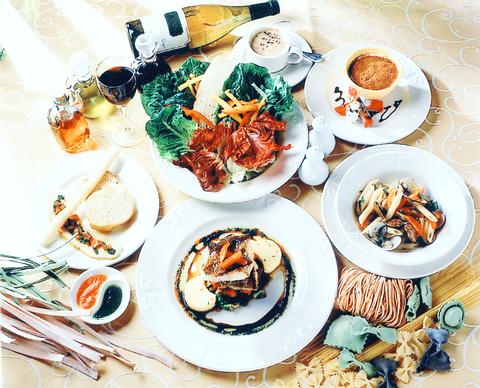Adjacent to the lobby of the Brother Hotel is this landmark's small and comfortable Viola Italian Restaurant, where at almost all hours of the day one can catch a tasty and classy meal.
The restaurant's menu is expansive, encompassing seafood, meat, pastas and pizzas and is suited to breakfast, lunch or dinner. For greater value and for the sake of simplicity, most diners will want to jump to the set menus at the back of the menu. These offer a fine balance of dishes to make up a complete meal that, in the larger sets, would be enough to fill a sumo wrestler. The large portions, however, do not mean corners are cut when it comes to taste.
The most basic set meal, for example, comes with either a soup or salad, a choice from among eight pastas and eight sauces, fruit and either coffee or tea for NT$380. Many, though not all, of the pastas are handmade on site, which ensures their freshness and exquisite texture, while the variety of sauces can suit most any taste. The restaurant's pomodoro and pesto sauces are unique in their consistency and flavor, with an emphasis on basil to the exclusion of garlic.

PHOTO COURTESY OF VIOLA ITALIAN RESTAURANT
Other set meals are more elaborate and consequently more expensive (up to NT$1,480), with choices of meat or seafood and small bowls of pasta, as well as the house specialty, tiramisu. It would take an extremely hungry person, or, two as is often the case, according to assistant manager Julia Yu (
All the elements of the set menus can be ordered a la carte for those who would like to sample the specialty main dishes but can't put down the whole set menu. Among these, the sea bass stands out in particular as a true delicacy, with tender meat seared to perfection on a bed of fresh mashed potatoes.
Being an Italian eatery there are, of course, pizzas, all of which are priced between NT$280 and NT$380. These come in seven, thin-crust varieties and the kitchen can add or remove toppings when customers have a special craving for something that may not be featured on the menu's pizzas. The restaurant also serves an assortment of Italian sandwiches for NT$180.
In its large servings and especially its heavy cream sauces and soups, Viola Italian Restaurant occasionally tends toward the grandiose to leave an impression. Provided one chooses the lighter items on the menu, however, the restaurant offers great Italian food at eminently reasonable prices.

One of the biggest sore spots in Taiwan’s historical friendship with the US came in 1979 when US president Jimmy Carter broke off formal diplomatic relations with Taiwan’s Republic of China (ROC) government so that the US could establish relations with the People’s Republic of China (PRC). Taiwan’s derecognition came purely at China’s insistence, and the US took the deal. Retired American diplomat John Tkacik, who for almost decade surrounding that schism, from 1974 to 1982, worked in embassies in Taipei and Beijing and at the Taiwan Desk in Washington DC, recently argued in the Taipei Times that “President Carter’s derecognition

This year will go down in the history books. Taiwan faces enormous turmoil and uncertainty in the coming months. Which political parties are in a good position to handle big changes? All of the main parties are beset with challenges. Taking stock, this column examined the Taiwan People’s Party (TPP) (“Huang Kuo-chang’s choking the life out of the TPP,” May 28, page 12), the Democratic Progressive Party (DPP) (“Challenges amid choppy waters for the DPP,” June 14, page 12) and the Chinese Nationalist Party (KMT) (“KMT struggles to seize opportunities as ‘interesting times’ loom,” June 20, page 11). Times like these can

JUNE 30 to JULY 6 After being routed by the Japanese in the bloody battle of Baguashan (八卦山), Hsu Hsiang (徐驤) and a handful of surviving Hakka fighters sped toward Tainan. There, he would meet with Liu Yung-fu (劉永福), leader of the Black Flag Army who had assumed control of the resisting Republic of Formosa after its president and vice-president fled to China. Hsu, who had been fighting non-stop for over two months from Taoyuan to Changhua, was reportedly injured and exhausted. As the story goes, Liu advised that Hsu take shelter in China to recover and regroup, but Hsu steadfastly

You can tell a lot about a generation from the contents of their cool box: nowadays the barbecue ice bucket is likely to be filled with hard seltzers, non-alcoholic beers and fluorescent BuzzBallz — a particular favorite among Gen Z. Two decades ago, it was WKD, Bacardi Breezers and the odd Smirnoff Ice bobbing in a puddle of melted ice. And while nostalgia may have brought back some alcopops, the new wave of ready-to-drink (RTD) options look and taste noticeably different. It is not just the drinks that have changed, but drinking habits too, driven in part by more health-conscious consumers and